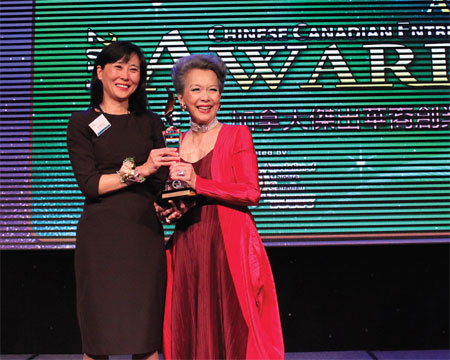Poy helps shape a country with leadership
Updated: 2014-09-19 12:12
By D Woo(China Daily USA)
|
||||||||
Since Dr Vivienne Poy retired from the Senate of Canada two years ago, she has kept herself busy. Her recent projects included support for the Canadian Museum for Human Rights in Winnipeg, and completing a new book on her husband's family.
|
Vivienne Poy (right) is presented with the 2014 Association of Chinese Canadian Entrepreneurs (ACCE) Lifetime Achievement Award for her distinguished business career and contributions to Canadian politics, Asian culture and multicultural activities, this March in Markham, Ontario. The presenter is Judy Lee, vice-president of Commercial Banking at RBC. Li Na / China Daily |
As the first person of Asian heritage to be appointed to the Senate of Canada, Poy said improving the profile of Asians in Canada was her most important task.
On that she was successful as May has been established as Asian Heritage Month in Canada due to her efforts. "Celebrating our Asian heritage in May continues to be a great success, particularly in the field of education, and bringing awareness to communities across Canada of the past and present contributions of Asian Canadians," she said.
As a senator, she was able to encourage many young Canadians to embrace cultural diversity and to be active in their communities. Another important role she undertook was to help constituents in matters of immigration and citizenship, and to help them adjust to their new lives in Canada.
Poy does have one regret. "I wish I had been able to amend our National Anthem through legislation to make it inclusive of women. I tried a few times, but because there was no political will from the federal government, it failed to become a reality. I am certain this will be taken up by future generations of Canadian women."
She refers to the phrase "True patriot love in all thy sons command", which she believes should be changed to "True patriot love in all of us command." She believes this would better reflect Canada as a country where men and women are held in equal regard.
When Poy immigrated to Canada as a student in 1959, nobody could have predicted that she would later become one of the most well known members in the Chinese-Canadian community, and a formidable figure in Canadian society at large.
Poy was born in Hong Kong in 1941.When the Japanese invaded the British colony, her family fled with her as an infant to the mainland. After the Japanese surrendered, her family returned to Hong Kong, helping to rebuild and restore the city after the war.
In 1959, Poy enrolled at McGill University in Montreal where she pursued her interest in history.
She subsequently studied fashion design at Seneca College and received a diploma in fashion arts. She founded her own business, Vivienne Poy Mode, in 1981. As an entrepreneur and fashion designer, Poy attained tremendous success.
Over the years she has held many positions of importance in the business world, including president of Vivienne Poy Enterprises, president of Calyan Publishing, chairperson of Lee Tak Wai Holdings Ltd. and a member of the board of the Bank of East Asia in Canada.
In addition to her life as a business leader, Poy is also a respected historian. She also holds master's and doctor of philosophy degrees in history from the University of Toronto.
She has published five highly-regarded books. One of them, A River Named Lee, reflects the recent history of Hong Kong in the last hundred years. The second one, Building Bridges: The Life and Times of Richard Charles Lee, discusses the Lee Family and her father's life story. Her third book, published by the University of Wollongong in Australia, is about the Chinese in Canada, called Citizenship and Immigration: The Chinese-Canadian Experience. Her fourth book, released in 2006 by the York Centre for Asian Research and the Hong Kong Institute of Education, is called Profit, Victory & Sharpness -The Lees of Hong Kong, and features the biographies of Poy's father and grandfather. Her last book, Passage to Promise Land, was released last year by McGill-Queen's U. Press. She also co-edited and contributed to The China Challenge: Sino-Canadian Relations in the 21st Century, Published by University of Ottawa Press in 2011.
In 1998 Poy received a phone call from then Prime Minister Jean Chretien, appointing her to the Senate of Canada and thereby becoming the first Canadian of Asian heritage to be appointed to the upper chamber. For someone without political training this was uncertain terrain, but nevertheless a patriotic duty that she couldn't decline.
Nearly two decades later, history has shown that Chretien was visionary in selecting a community leader from an ethnic minority. His bold decision promoted multiculturalism in Canada. Poy's tireless work for public organizations and charities has rewarded the country with an example of what immigrants can achieve.
When Prime Minister Trudeau introduced the federal policy of multiculturalism in 1971, some people felt it was divisive for Canada.
"When ethnic minority groups keep and share their cultural identity and heritage, and show their loyalty to Canada, they are happier citizens and this promotes social unity," she said.
"I feel we must maintain our cultural heritage, but we must also recognize that Canada is our country, and that we have to be loyal to Canada first - to core Canadian values. I object to double loyalty - one cannot be loyal to two countries. If you have decided to come to Canada, this is your country," she said.
Overall, Poy believes: "The Chinese Canadian community has had a very positive impact in every sphere in Canadian society."
Apart from being a writer and business leader, Poy has spent considerable time supporting the community. Poyalso served as chancellor of the University of Toronto from 2003 to 2006 and is now chancellor emeriti. She continues to be very involved with the college.
She was instrumental in the establishment of the Richard Charles Lee Canada-Hong Kong Library at the University of Toronto in 2009. Named in honor of Poy's father, Richard Charles Lee, one of the foremost businessmen and philanthropists of his day, the library houses the largest collection of research materials on Hong Kong outside of Asia. The Richard Charles Lee Chair in Chinese Canadian Studies has also been established at the University of Toronto.
Her current efforts to support the Canadian Museum for Human Rights promise to bring many benefits to the country.
"I've been on their advisory council for more than 10 years. Human rights are basic to us as human beings. The Chinese Canadian National Campaign supports the concept of human rights, which we all need to uphold. It was a very long fight for our community to obtain human rights in Canada, without which our community would not be prosperous and excel in all professions today."
The museum, located in Winnipeg, promotes education in the evolution of human rights while visitors can also learn about human-rights abuses in history. Poy has helped to raise over $2 million for the Breaking the Silence Gallery in the museum, and credit will be given to the Chinese Canadian Community. She continues to bring about awareness of human rights worldwide.
The exhibition in the museum involving Chinese Canadians' struggle for human rights is in the Canadian Journey Gallery. It includes the Chinese head tax, a fee amounting to as much as $500 charged to each Chinese person entering Canada, before it was abolished in 1923 when Chinese exclusion was implemented by legislation.
She was recognized as one of Canada's Top 100 Most Powerful Women by the Women's Executive Network.
In private, she is a wife, a mother, and a loving grandmother. She and her husband Dr Neville Poy, have a loving marriage. They have three sons and three grandchildren.
contact the writer at readers@chinadailyusa.com
For China Daily
(China Daily USA 09/19/2014 page11)
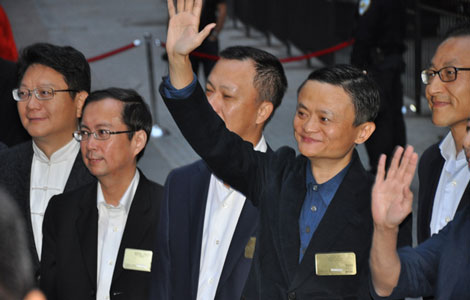
 Alibaba IPO on NYSE
Alibaba IPO on NYSE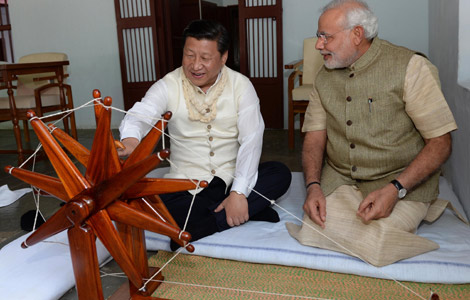
 Benefit of teaming up goes beyond borders
Benefit of teaming up goes beyond borders
 Beijing center hosts art exhibition inspired by LA
Beijing center hosts art exhibition inspired by LA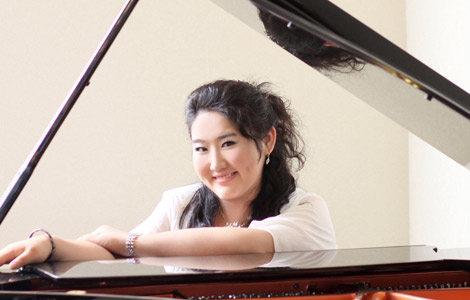
 Young pianist joins an elite roster
Young pianist joins an elite roster
 WWII relics put on display
WWII relics put on display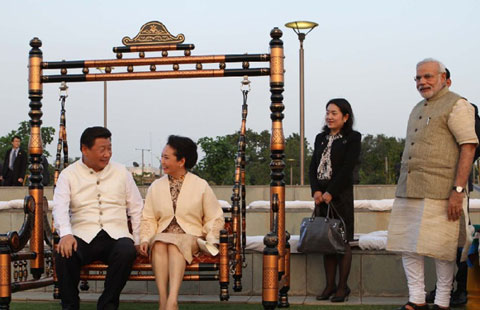
 President Xi and wife play swing in Modi's home state
President Xi and wife play swing in Modi's home state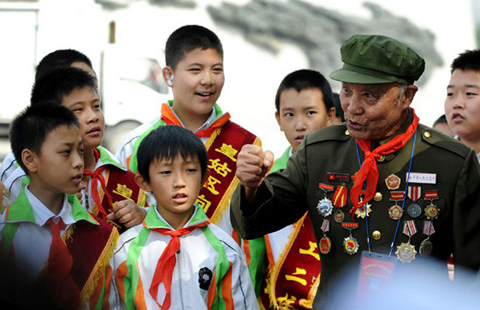
 9.18 Incident marked in China
9.18 Incident marked in China
 PLA's 'Gold Helmet' air battle contest takes off
PLA's 'Gold Helmet' air battle contest takes off
Most Viewed
Editor's Picks

|

|

|

|

|

|
Today's Top News
Alibaba jumps more than 40% in trading debut
Chinese queue up for Apple iPhone 6
Alibaba Day
Carbon issue consensus is expected at UN
Off-limit investment list should get shorter, premier says
Chinese shoppers fuel US retail sales online, on tour
Xi, Modi set friendly tone for visit
China refutes US hacking charges
US Weekly

|

|
